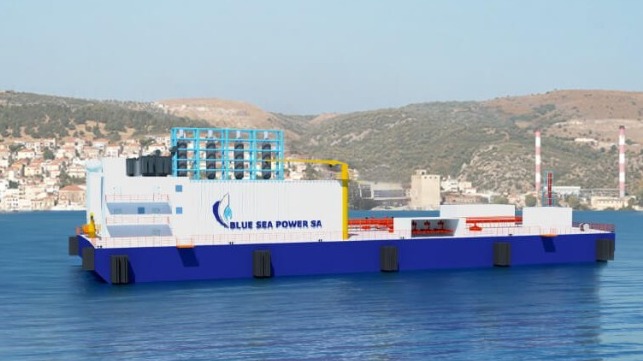LNG or Hydrogen to Fuel Gas-to-Power Barges for Greek Islands

Working to develop new sources of environmental-friendly power generation, Cyprus-based Blue Sea Power and UK engineering firm Houlder are developing designs for gas-to-power barges that will use LNG, and later bio-LNG or hydrogen to generate power. The companies expect to complete the designs for their novel power barges in 2023 and to deploy the first three barges in the Greek islands in 2025.
“Floating LNG power barges are greener than traditional power generation infrastructure and with novel integrated design and engineering developments, we can make energy production even more efficient and sustainable,” said Jonathan Strachan, Houlder’s ship design and engineering director.
Blue Sea reports that it has obtained electricity production licenses from the regulators for the Greek Islands of Kos, Chios, and Lesvos and that it is on track to provide all three islands with greener, lower-emission power. The barges will replace outdated and inefficient existing diesel and heavy fuel oil power generation infrastructure. The three islands are non-interconnected with the concept that the barges will provide both baseload and peak power when existing renewable solar and wind energy utilization is at its technical limits. The company believes there is also potential to develop many more barges and scale up the projects to efficiently provide other Greek islands and EU locations with green energy.
The design will initially use liquified natural gas but will also be future-ready for emerging solutions to further increase sustainability. The engines will be ready for hydrogen production blend. They also plan to factor into the supply chain and design blend bio-LNG and renewable synthetic e-LNG as an alternative to further reduce GHG emissions.
“Whilst the FSRP integrated power barge is a solution that may appear novel in its approach, the power barge utilizes proven tried and tested equipment to reduce associated design and construction risks,” says Mark Graham, Blue Sea Power Director of Projects. “The FSRP near-shore solution along with its modular design and shipyard construction also presents many repeatability benefit opportunities on CAPEX, OPEX, and construction schedule savings.”
Houlder will complete the barge designs to achieve approval in principle by the class society, Lloyd’s Register, and will support Blue Sea Power with the design package for securing suitable tenders from shipyards. Houlder previously completed the key decision studies on the main power generation engine selection, a cargo containment system, design standardization, GHG reduction and efficiency options, and CAPEX. An environmental study addressed issues including the impact on seawater temperature and noise pollution.

that matters most
Get the latest maritime news delivered to your inbox daily.
Among the innovations that they look to incorporate into the design are technical solutions including maximizing waste heat recovery from the exhaust and using waste heat recovery from the engine’s cooling water system for freshwater generation for export. The barges will also maximize cold energy recovery from the LNG evaporation and use variable frequency drives to improve the efficiency of motors onboard. The team also expects to use a cryogenic carbon capture system onboard the power barges.
To adhere to ambitious EU greenhouse gas (GHG) emissions requirements, the barges must generate power efficiently. According to EU Taxonomy regulations on GHG emissions for new power plants in Greece, the limit is 270g of CO2 per e/kWh or a 20-year average of 550kgCo2/kWh. Houlder will incorporate solutions to meet and exceed these standards.
